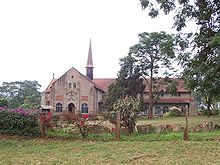- National Council of Churches of Kenya
-
The National Council of Churches of Kenya (NCCK) [1], (in Swahili, Jumuia Ya Makanisa Ya Kenya) is a fellowship of Protestant churches and Christian organisations registered in Kenya. Its motto is 'For Wananchi' which means for citizens (Wananchi is translated citizens in Swahili), and this motto has been exemplified in NCCK's long involvement in social responsibility, public service and advocacy in Kenya.
Contents
History
It was established in 1913 to provide a forum for addressing issues facing the people of Kenya (then British East Africa). In its almost 100 years of existence, it has been a key player in mobilizing Kenyans in various political, economic, and social issues. As such, NCCK's story is intricately intertwined with Kenya's national historical narrative.
- 1844- Dr Johann Ludwig Krapf, a German and the first missionary arrives in Kenya (British East Africa) and starts work at the Coast. He is soon followed by other missionaries including Johannes Rebmann who establish several mission stations around the country.
- 1908- By now several issues face the missionaries who have greatly increased in number, including the need for commonality in the names referencing God in the different local languages and dialects. Two mission conferences are held that year in Kijabe and Maseno.
- 1909- Another conference is held in Kijabe, which paves the way for the formation of NCCK. A key resolution is made: "This Conference regards the development, organisation and establishment of a united self-governing, self-supporting and self-extending Native Church as the ideal in our Missionary Work." [2]
- 1913- The first United Missionary Conference is held in June 1913, in Thogoto, Kikuyu, Kenya, where nine missionary groups attend. A constitution proposing the formation of the Federation of Missions is discussed, and four missionary groups sign it. NCCK is born.
- 1918- At the second United Missionary Conference, the name of the organization is changed to Alliance of Protestant Missions.
- 1924- The goals of the organization change, and the membership is expanded beyond the original four members. A new body called the Kenya Missionary Council is formed.
- 1943- As the country inches towards independence, there is need to broaden the membership to accommodate non-missionary Christian bodies. The objectives change once again, and the organization is then called Christian Council of Kenya (CCK).
- 1966- Kenyans have gotten independence. To reflect the new state of affairs, the organization re-brands into National Christian Council of Kenya.
- 1984- The name of the organisation was changed to National Council of Churches of Kenya to reflect the fact that membership to the organisation is by churches and not individual Christians.
Membership
NCCK has 42 member churches and organizations, who seek to facilitate the attainment of a united, just, peaceful and sustainable society[3]. That is; 25 member churches, 11 Associate Members and 6 Fraternal Associate Members. These are:
Full Members
Africa Brotherhood Church
African Christian Churches and Schools
African Church of the Holy Spirit
African Interior Church
African Nineveh Church
Anglican Church of Kenya
Church of Africa Sinai Mission
Coptic Orthodox Church
Episcopal Church of Africa
Evangelical Lutheran Church of Kenya
Friends Church in Kenya
Kenya Assemblies of God
Kenya Evangelical Lutheran Church
Kenya Mennonite Church
Lyahuka Church of East Africa
Maranatha Faith Assemblies
Methodist Church in Kenya
National Independent Church of Africa
Overcoming Faith Centre Church of Kenya
Pentecostal Evangelistic Fellowship of Africa
Presbyterian Church of East Africa
Reformed Church of East Africa
Salvation Army
Scriptural Holiness Mission
Zion Harvest MissionAssociate Members
Bible Society of Kenya [4]
Christian Churches Education Association
Christian Health Association of Kenya
Kenya United Independent Churches
Kenya Ecumenical Church Loan Fund
Kenya Students Christian Fellowship [5]
St Paul's University [6]
Young Women's Christian Association (World YWCA)
Young Men's Christian Association (YMCA)Fraternal Members
African Evangelistic Enterprise [7]
Daystar University
Fellowship of Christian Unions (FOCUS)
Trans World Radio
Trinity Fellowship
World Vision InternationalGovernance of the Council
The supreme body of NCCK is the General Assembly (GA), which meets once every two years. The GA has an Executive Committee which meets biannually. This Committee has two sub-committees, namely, the Programme Committee, and the Finance and Administration Committee. These committees meet regularly throughout the year, and work closely with the management team. The day to day management of the Council is the responsibility of management team under the leadership of the General Secretary who is also the Chief Executive Officer of the Council.
Officer of the Council Name Chairman Rev. Dr Charles Kibicho Vice Chairman Rt. Rev. Josiah Were Honorary Treasurer Mr Joseph Muriu General Secretary Rev. Canon Peter Karanja Chairman, Finance & Administration Committee Ms. Emmy Migaliza Chairman, Program Committee Rev. Geoffrey Songok Deputy General Secretary Mr Oliver Kisaka
Management TeamPosition Name General Secretary Rev. Canon Peter Karanja Deputy General Secretary Mr Oliver Kisaka Director, Programs Ms Suzie Ibutu Director, Human Resource & Administration Ms Linet Ndolo Director, Commercial Ms Dora Waruiru Manager, Finance Ms Mary Wanjiku Facilities
The Council's headquarters are located at the Jumuia Place, Lenana Road, Nairobi. This facility also serves as the Nairobi Region offices. NCCK maintains nine regional offices throughout Kenya as well as five conference or retreat centers namely:
- Ol-Lerai - The Meeting Boma
- Jumuia Guest House, Kisumu
- Jumuia Guest House, Nakuru
- Jumuia Conference and Country Home, Limuru
- Jumuia Conference and Beach Resort, Kanamai
References
- http://www.ncck.org/index.php/about-ncck/our-journey.html
- http://www.unhcr.org/refworld/publisher,IRBC,QUERYRESPONSE,KEN,3df4be5211,0.html
- http://www.simplesolutions.co.ke/cwsea/partners/partnerprofile.asp?partnerid=53
- http://www.peoplebuildingpeace.org/thestories/article.php?typ=theme&id=121&pid=28
- http://www.globalministries.org/africa/partners/national-council-of-churches.html
- http://www.oikoumene.org/en/member-churches/regions/africa/kenya/ncck.html
- http://www.ncck.org/index.php/information/150.html
- http://allafrica.com/stories/201104111367.html
External links
Categories:- Christianity in Kenya
- 1844- Dr Johann Ludwig Krapf, a German and the first missionary arrives in Kenya (British East Africa) and starts work at the Coast. He is soon followed by other missionaries including Johannes Rebmann who establish several mission stations around the country.
Wikimedia Foundation. 2010.

